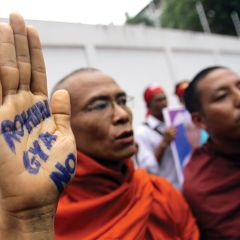Culture and Conflict: Asia Writ Large

2013 to 2014
Emerging Networks
Culture and Conflict: Asia Writ Large is a departmentally based project in Asian & Middle Eastern Studies (AMES), where faculty are convinced that as the borders of the world open and the frequency and intensity of cross-cultural contact increase, the critical study of culture is an indispensable tool for understanding these conflicts. This initiative will examine the nexus of culture and conflict in a region historically divided by strife. Two primary concerns are to interrogate the argument that cultural differences inevitably lead to and justify conflicts and to examine how conflicts shape a culture's knowledge production.
The core of the network is a faculty/student working group that will meet regularly starting in the 2013-14 academic year. It will explore the intersection of the cultural, political, demographic, and physical that has shaped the question of “Asia” throughout the long twentieth century, starting in the 1880s. The working group will consist of faculty, graduate students, and advanced undergraduates from AMES and beyond—the interdisciplinary nature of the topic invites participation from the Social Sciences, Public Policy, Law School, Kenan Institute of Ethics, etc. The group will engage three specific goals:
New courses. The working group will develop a gateway course tentatively called “Asia Rising: Conflict/Culture” that will cover the role played by global and local conflicts in shaping and informing the “Rise of Asia” in the aftermath of World War II. In addition, two courses will be developed to complement AMES's current offerings: “Asian Empires and Transpacific Connections: China, Korea, Japan, and the United States” and “The Indian Subcontinent: Culture of Partitions and Statehood.”
New teaching material. A basic challenge facing those who teach inter-regional courses is a lack of useable textbooks to provide students with a good yet concise social, economic, political, and military history background needed for intelligent cultural analysis. The working group will put the collective experience of its members to use compiling an eReader to fill the gap. Their discussions will lay a foundation for the development of other material, as well, such as online multimedia resources or a simulated conflict-resolution game.
Extracurricular safe zones. Though conflict is the focus of study, it should not characterize the classroom experience. On the contrary, students of divergent backgrounds, perhaps rooted on opposing sides of a studied conflict, need a safe space to explore politically contested and emotionally loaded topics. To that end, the initiative will create a series of social events that use film, literature, music, theater, and art to humanize the global and national processes that students are approaching critically in class. One hope is to extend the very positive experience of AMES's annual Arabic/Hebrew Culture Night to a similar Japanese/Chinese/Korean gathering.
People
|
Associate Professor Chair of Asian & Middle Eastern Studies |
Andrew W. Mellon Assistant Professor of Hebrew and Israeli Cultural Studies |
Andrew W. Mellon Assistant Professor of Korean and Japanese Cultural Studies |



